

Fastbook. Hybrid mobile apps take off as HTML5 vs. native debate continues. Everyone seems to be gung-ho about HTML5 or native mobile apps, and religiously preaching for one approach over the other.
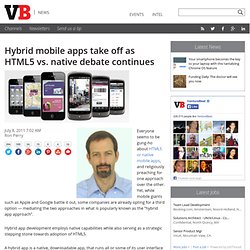
Yet, while mobile giants such as Apple and Google battle it out, some companies are already opting for a third option — mediating the two approaches in what is popularly known as the “hybrid app approach”. Hybrid app development employs native capabilities while also serving as a strategic stepping stone towards adoption of HTML5. A hybrid app is a native, downloadable app, that runs all or some of its user interface in an embedded browser component. To the user, a hybrid app is almost indistinguishable from a native one: it is downloaded from the app store or marketplace, it is stored on the device, and it is launched just like any other app. But to developers there is a huge difference, because instead of rewriting the app from scratch for each mobile OS, they write at least some of their application code in HTML, CSS and JavaScript, and reuse it across devices. Native, HTML5, or Hybrid: Understanding Your Mobile Application Development Options.
Navigation: Developer Force | Salesforce Mobile Services | Native, HTML5 or Hybrid Screens are small, apps are big, and life as we know it is on its head again.
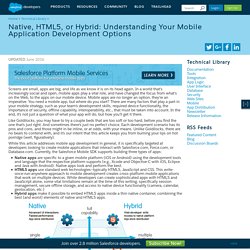
In a world that's increasingly social and open, mobile apps play a vital role, and have changed the focus from what's on the Web, to the apps on our mobile device. Mobile apps are no longer an option, they're an imperative. You need a mobile app, but where do you start? There are many factors that play a part in your mobile strategy, such as your team’s development skills, required device functionality, the importance of security, offline capability, interoperability, etc., that must be taken into account.
Like Goldilocks, you may have to try a couple beds that are too soft or too hard, before you find the one that’s just right. S HTML5 Adventure. Be on the lookout!

Wooga has just released a very special creation into the wild as an open source project. That creation is ‘Pocket Island’, a HTML5 game developed by Wooga that is now available for all to download and iterate upon. Pocket Island is the result of an ambitious one year project here at Wooga with the original goal being to push HTML5 gaming into new territory and create one of the world’s most advanced HTML5 titles.
One year later and it’s mission accomplished. Now, Wooga wants to see how the HTML5 community can use the lessons learned from Pocket Island and develop the technology forward to the point where it’s fit for mass market consumption. Facebook should be worried about Wooga’s HTML5 exit — European technology news. Q&A: Zipline CEO Todd Hooper, Mobile Games and the HTML5 Hype Cycle. As an evolving standard, HTML5 will be good for lots of different things.
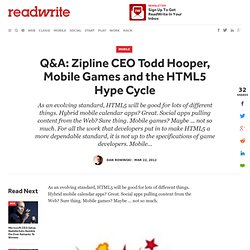
Hybrid mobile calendar apps? Great. Social apps pulling content from the Web? Sure thing. Mobile games? For all the work that developers put in to make HTML5 a more dependable standard, it is not up to the specifications of game developers. Zipline, Moai and HTML5 Hooper and Zipline Games are about ready to release Moai 1.0, the company's "backend-as-a-service" designed specifically for the needs of gamers. ReadWriteMobile readers will recognize Hooper as a frequent commenter to the site as well as the "HTML5: Hype vs. Below is a transcript of our conversation with Hooper touching on HTML5 issues, Moai's advantages, Facebook and mobile Web app deployments. Hooper vs. ReadWriteMobile:HTML5 -- Not ready for games or will it never be the standard that games are created with for mobile?
Todd Hooper: Good question. HTML5 game development issues. HTML5: Too Good To Be True? GameDuell's Michael Kalkowski and Jonas Gebhardt pull apart the problems and myths around HTML5 Although HTML5 is currently present everywhere in game development, most developers feel that the technology will be an important asset tomorrow, not today.
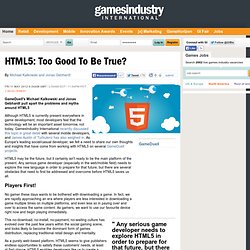
GamesIndustry International recently discussed this topic in great detail with several mobile developers, and James Austin of Turbulenz has also weighed in. As Europe's leading social/casual developer, we felt a need to share our own thoughts and insights that have come from working with HTML5 on several GameDuell projects. HTML5 may be the future, but it certainly isn't ready to be the main platform of the present. Any serious game developer (especially in the web/mobile field) needs to explore the new language in order to prepare for that future, but there are several obstacles that need to first be addressed and overcome before HTML5 saves us all. Players First! No gamer these days wants to be bothered with downloading a game.
(2) Native Mobile App Vs. Web App: Is it possible to create an HTML5 mobile app that looks and performs exactly like a native app. (2) If releasing a mobile app for iPhone and Android in the next two to four months, is it better to develop in HTML5, or develop native apps. Zuckerberg admits fault in Facebook's HTML5 focus, pledges native Android app. A Blow To HTML5. Mark Zuckerberg confirms native Android application, says HTML5 was a mistake.
Live at Techcrunch Disrupt, Facebook CEO and founder Mark Zuckerberg confirmed that the company would be developing a native Facebook application for Android, and that the company regretted choosing HTML5 as their technology for mobile devices.
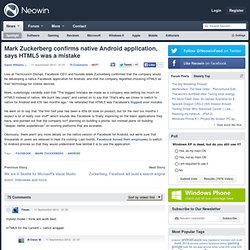
Mark, surprisingly candidly said that "The biggest mistake we made as a company was betting too much on HTML5 instead of native. We burnt two years" and carried on to say that "that's why we chose to switch to native for Android and iOS two months ago. " He reiterated that HTML5 was Facebook's biggest ever mistake. He went on to say that "the first half year has been a little bit slow on product, but for the next six months I expect a lot of really cool stuff" which sounds like Facebook is finally improving on the basic applications they have, and pointed out that the company isn't planning on building a phone, but instead plans on building "deeper, better experiences" on existing platforms that are available. HTML5 is overhyped, no threat to native iOS and Android apps. Industry watchers often debate whether or not HTML5-based Web apps pose a threat to the massive ecosystems that revolve around native apps.
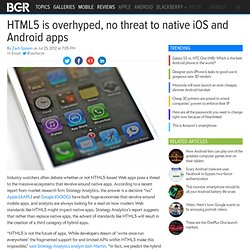
According to a recent report from market research firm Strategy Analytics, the answer is a decisive “no.” Apple (AAPL) and Google (GOOG) have built huge economies that revolve around mobile apps, and analysts are always looking for a read on how modern Web standards like HTML5 might impact native apps. Strategy Analytics’s report suggests that rather than replace native apps, the advent of standards like HTML5 will result in the creation of a third category of hybrid apps.
“HTML5 is not the future of apps. While developers dream of ‘write once run everywhere’ the fragmented support for and limited APIs within HTML5 make this impossible,” said Strategy Analytics analyst Josh Martin.